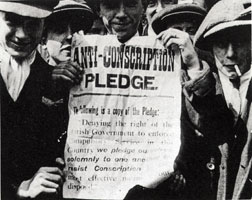17 April 2008 Edition
Remembering the Past: General strike against conscription

By Mícheál Mac Donncha
ON 16 APRIL 1918 the British House of Commons passed the Military Service Bill, which empowered the British Government to enforce conscription – compulsory service in the British Army – for all men of military age in Ireland. The overwhelming resistance to this measure by the Irish people saw unprecedented political unity and the biggest withdrawal of labour in Ireland before or since.
The British attempt to enforce conscription dealt a fatal blow to the Irish Parliamentary Party. It withdrew its MPs from Westminster. It also withdrew its candidate from the Offaly by-election on 19 April, ensuring that Sinn Féin candidate Patrick McCartan was returned unopposed. This was the latest in the series of Sinn Féin by-election victories, a prelude to the general election victory the following December.
Events moved rapidly in the days after the Military Service Bill was passed. The Lord Mayor of Dublin hosted a conference in the Mansion House on 18 April, bringing together the leaders of Sinn Féin, the Irish Parliamentary Party and the Irish Trade Union Congress. A pledge against conscription was agreed, stating that all would resist the measure “by the most effective means at our disposal”.
On 20 April, the Irish Trade Union Congress held an emergency conference attended by 1,500 delegates. It was decided to have a general strike on 23 April. On Sunday 21 April, hundreds of thousands of people throughout the 32 Counties signed the anti-conscription pledge. Preparations then began for the general strike.
The Irish trade union movement had grown enormously since the 1913 Dublin Lock-out. The largest union, the Irish Transport and General Workers’ Union, had 5,000 members in 1916. By the end of 1918 the ITGWU had 68,000 members. It was the backbone of the strike on 23 April.
Historian of the ITGWU, C.Desmond Greaves, has described the strike as “the greatest shut-down in Irish history”. Factories, shops, schools and workplaces of all kinds closed. Workers paraded in towns throughout the country and the strike was effective in every county. It was incomplete in Belfast and surrounding districts yet 3,000 workers, many of them Protestants, attended an anti-conscription rally outside City Hall. In Ballycastle, County Antrim, Orange and Green marched together with bands playing The Boyne Water and A Nation Once Again.
The British Labour Party and TUC issued a joint statement with the Irish TUC condemning conscription.
Faced with almost universal opposition in Ireland and growing opposition from workers in Britain, the government in London backed down. They postponed the ‘Order in Council’ that would have imposed conscription and it was never introduced before the First World War ended in November 1918.
The general strike against conscription in Ireland took place 90 years ago this week.


